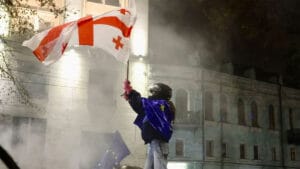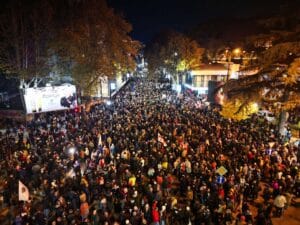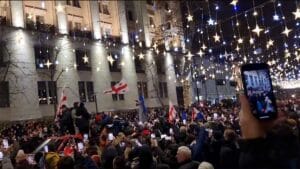Salome Zurabishvili
Georgia Protests Intensify in 2025: Update, January 1-3
The new year has not brought respite to Georgia’s political crisis. From January 1-3, 2025, protests continued with renewed force, demonstrating the unwavering resolve of Georgian citizens against the ruling Georgian Dream (GD) party. What began as demonstrations against the…
Update for December 30-31: Festivities Continue as Protests Escalate Amid Political Tensions in Tbilisi
As 2024 draws to a close, Georgia finds itself gripped by a deepening political crisis, marked by sustained mass protests and a series of governmental actions that have further inflamed public discontent. The ongoing 33-day wave of demonstrations, with planned…
Georgia’s December 29th Turning Point: Opposition Rises Against Inauguration Amidst Protests and International Support
December 29 marked a day of escalating tensions in Georgia as political divisions, protests, and questions of legitimacy engulfed the country. At the heart of the unrest was the inauguration of Mikheil Kavelashvili, the Georgian Dream party’s chosen candidate, as…
Protests Continue in Tbilisi: December 26th Demonstrations and Developments
The ongoing protests in Tbilisi have reached their 28th day, with citizens maintaining their demand for political and social reforms. The day’s schedule includes a diverse range of rallies, reflecting the widespread participation of various groups in society. Demonstrations are…
Georgia’s Struggle for Democracy and EU Integration: Updates from December 24-25
The past days in Georgia have been marked by a steadfast commitment to democracy and European integration, as citizens continue their protests and political activities. On December 25, the 28th day of demonstrations saw women leading a march that culminated…
Georgia’s Struggle: Updates from December 22-23 Protests
As December unfolded, Georgia witnessed a surge in nationwide protests, culminating in a dramatic series of events over December 22–23. Protesters, fueled by dissatisfaction with alleged election fraud and human rights abuses, gathered en masse at Rustaveli Avenue and other…
Tbilisi Protests Persist: Georgia, December 21 Updates (VIDEO)
On December 21, thousands of Georgians marched in Tbilisi, culminating in a massive rally on Rustaveli Avenue. Participants from various regions and university students, including those from the Free University and Agrarian University, brought vibrant energy to the demonstrations. A…
Massive Marches and Political Demands Mark Georgia’s December 21 Protests
On December 21, Georgia witnessed an unprecedented series of protests organized by opposition groups and civil society, with a packed schedule of marches across Tbilisi and beyond. Participants from various professional and social groups united to call for new elections,…
Georgia’s European Path Amid Growing Protests and Political Unrest
The political crisis in Georgia has entered a critical stage, as protests against the presidential elections and perceived government repression intensify. Events from December 11 to 14 revealed escalating public dissatisfaction, international concern, and deeper divisions between the Georgian Dream…
Georgia’s Fight for Europe: The Events of December 3
On December 3, Georgia became the stage for escalating tensions as citizens continued their fight for democracy and European integration. A series of key events unfolded throughout the day, reflecting the intensity of the ongoing protests and their impact on…
Georgia’s Halted EU Accession Sparks Protests and Global Criticism
The Georgian Dream (GD) party’s decision to suspend EU accession negotiations until 2028 has ignited a political storm across Georgia. Announced by Prime Minister Irakli Kobakhidze, the decision has led to widespread protests, accusations of democratic backsliding, and condemnation from…
Georgia Halts EU Accession Talks: Protests and Backlash Erupt Nationwide
The Georgian Dream (GD) government’s announcement to suspend EU accession negotiations until 2028 has ignited widespread protests, opposition unity, and international backlash. This decision, framed by Prime Minister Irakli Kobakhidze as a move for Georgia to “join the EU on…











